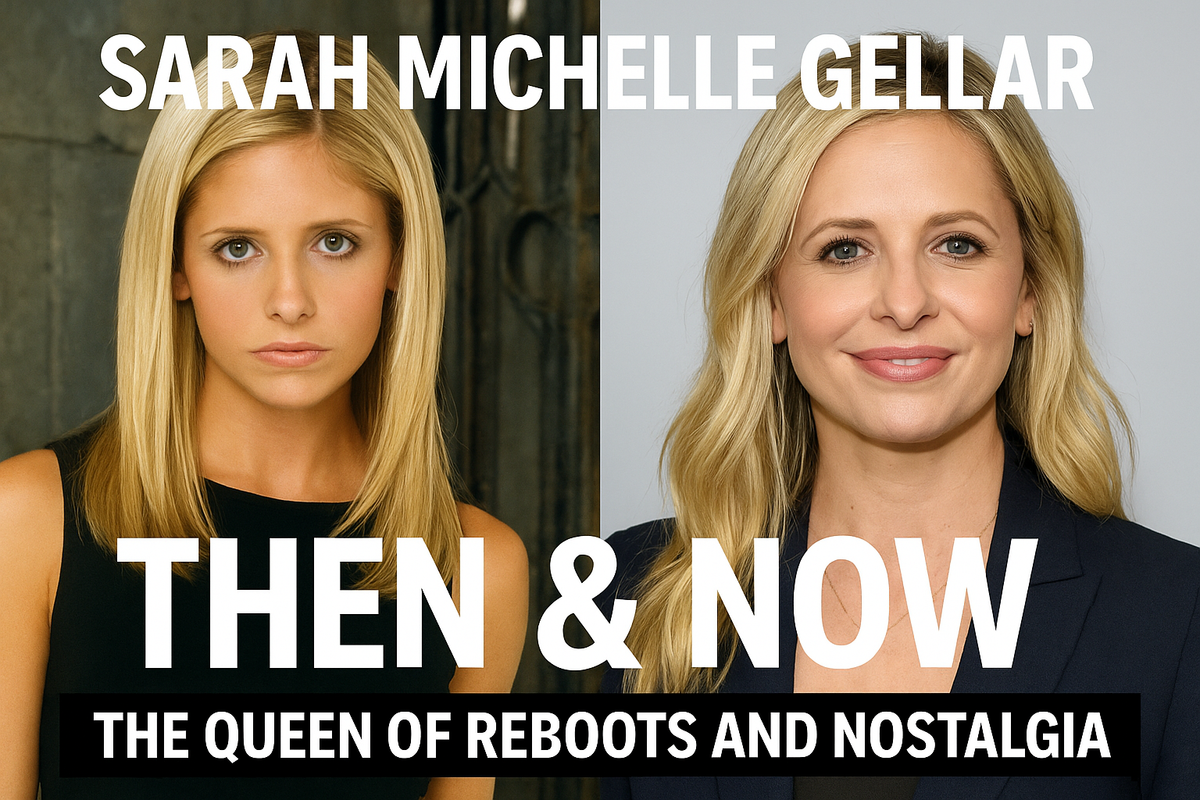Sarah Michelle Gellar on Reboots & Nostalgia: Why Hollywood Keeps Looking Back
Sarah Michelle Gellar champions reboots, blending nostalgia with modern storytelling. Her cameos remind us why audiences crave emotional connections, proving reboot culture reflects both comfort and creativity in today’s entertainment.

Introduction
Reboots are the heartbeat of Hollywood’s current obsession with the past. From Buffy the Vampire Slayer to Scream to Teen Wolf, audiences are bombarded with familiar faces and recycled titles dressed up for a new generation. Some fans love it. Others call it creative laziness. But when Sarah Michelle Gellar an icon of the late ’90s and early 2000s speaks on the subject, people listen.
The Buffy star has become something of a cultural spokesperson for reboot culture, defending its place in modern entertainment while also acknowledging the double-edged sword of nostalgia. With her recent cameos and renewed spotlight, Gellar reminds us that reboots aren’t just corporate money-grabs they’re emotional touchstones for audiences searching for familiarity in an unstable world.
This blog dives into Gellar’s defense of reboots, her own experiences with nostalgia-driven projects, and what the reboot boom really says about our cultural psyche.
Sarah Michelle Gellar’s Case for Reboots
Sarah Michelle Gellar, who defined an era as Buffy Summers, has been refreshingly honest about her stance on reboots. While some celebrities bristle at the thought of their work being revisited or “messed with,” Gellar has often argued that stories don’t truly belong to the actors they belong to the audience.
In interviews, she’s said that she doesn’t feel possessive over Buffy because the show transcended her. It became part of people’s lives, shaping their teenage years, friendships, and even values. To deny new generations the opportunity to reinterpret it, she argues, would be selfish.
“If a reboot allows a new audience to find comfort, hope, or even a hero — why not?” Gellar once explained.
That philosophy positions her as one of the few Hollywood veterans who sees reboots not as threats but as opportunities for fans, studios, and yes, actors who want to revisit their legacies.
Cameos & Returns: Gellar in Today’s Nostalgia Market
Over the past few years, Sarah Michelle Gellar has leaned back into the public eye through strategic cameos and reappearances in shows tied to nostalgia. Unlike some stars who avoid looking back, Gellar embraces it with a knowing wink.

- Wolf Pack (2023) – While not a reboot, Gellar’s casting in this supernatural series felt like a callback to her Buffy days. Audiences immediately drew parallels between her iconic vampire-slaying persona and her new role as a mysterious investigator.
- Teen Wolf: The Movie (2023) – Gellar promoted the project as a producer and mentor to a new generation of supernatural teens. Her presence behind the camera rather than in front reinforced her acceptance of passing the torch.
- Scream (Cameo Legacy) – Though she wasn’t in the newest Scream films, fans of Scream 2 always point to her role as part of the connective tissue between horror eras.
Her involvement in these projects isn’t accidental it’s calculated. Gellar has positioned herself as both a symbol of 90s nostalgia and a bridge to the reboot era.
Why Do We Keep Rebooting? The Psychology of Nostalgia
To understand Gellar’s defense of reboots, we have to zoom out. Why does Hollywood keep recycling? And why do audiences keep showing up?
The answer lies in nostalgia psychology. In times of uncertainty political upheaval, pandemics, social media chaos people gravitate toward the familiar. Reboots and remakes aren’t just entertainment. They’re emotional anchors.

Research shows that nostalgia helps reduce feelings of loneliness and anxiety. Watching a reboot of Buffy or Friends isn’t just about storylines. It’s about revisiting a time when life felt simpler, safer, or happier.
The Economics of Reboots
Let’s be clear: Hollywood isn’t only chasing emotions. It’s also chasing dollars. Reboots are low-risk investments. A studio knows that Buffy, Charmed, or X-Men already have a built-in fanbase. That means less money on marketing and a guaranteed audience on opening weekend.
But what does that mean for creativity? Critics argue that constant recycling stifles originality. Yet stars like Gellar remind us that new stories can still thrive inside old frameworks.
Table: The Reboot Economy at a Glance
| Aspect | Why Studios Love It | Why Fans Love It | Why Critics Hate It |
|---|---|---|---|
| Built-In Audience | Instant fanbase reduces marketing risk. | Familiar faces and stories return. | Leaves little room for fresh ideas. |
| Emotional Anchor | Emotional attachment = box office loyalty. | Comfort during uncertain times. | Exploits nostalgia without depth. |
| Cultural Relevance | Keeps old IP alive and marketable. | Allows younger fans to discover classics. | Often feels forced or unnecessary. |
| Star Power | Original actors create instant buzz. | Sense of continuity and authenticity. | Sometimes reduces them to cameos only. |
Gellar’s Unique Role in the Reboot Conversation
Unlike Harrison Ford (Indiana Jones), who often looks grumpy about reprising roles, or stars who outright reject their legacies, Sarah Michelle Gellar has carved a different path. She doesn’t necessarily want to star in every reboot but encourages the idea of reimagining stories for new audiences.
Her perspective is refreshing because it acknowledges both the emotional need audiences have and the creative freedom future storytellers deserve. She isn’t clinging to the past she’s contextualizing it.
The Buffy Question: Will It Ever Return?
No conversation about Gellar and reboots can avoid the big one: Buffy the Vampire Slayer. Rumors of a reboot have circled for years, with fans divided over whether it should ever happen.
Gellar herself has maintained a graceful distance. She’s said she doesn’t see herself reprising Buffy because the story was about the power of youth. However, she’s also said she wouldn’t oppose a new generation of Buffy stepping up to the plate.
This distinction matters. She isn’t shutting the door she’s just refusing to overshadow future interpretations.
Nostalgia, Reboots & Cultural Healing
At its core, reboot culture isn’t just about business or laziness. It’s about healing. When fans return to old shows or movies, they’re not just watching stories. They’re reconnecting with their younger selves, their friendships, their late nights huddled around the TV.
Sarah Michelle Gellar understands this better than most. She sees reboots not as shallow copycats but as cultural rituals. They’re reminders that even in a fragmented, uncertain world, some things like the comfort of a favorite show endure.

Conclusion: Why Gellar’s Voice Matters
In a Hollywood ecosystem divided between cynicism and sentimentality, Sarah Michelle Gellar offers a balanced voice. She acknowledges the financial motives behind reboots but elevates the conversation by focusing on their emotional impact.
Reboots, she argues, aren’t just about the past. They’re about the present and how we use stories to cope, connect, and carry forward.
As long as audiences keep craving the familiar, Hollywood will keep digging into its vaults. And as long as stars like Gellar continue to defend the practice, reboots will remain more than recycled scripts they’ll be mirrors of who we are and who we used to be.
Sources:
- Entertainment Weekly (EW.com) – Coverage of Sarah Michelle Gellar’s interviews and thoughts on reboots.
- Variety – Articles on Hollywood’s reboot culture and recent announcements.
- The Hollywood Reporter – Insights on celebrity cameos, nostalgia-driven media, and reboot trends.
- Deadline – News on TV and film reboots, including Buffy-related updates.
- Rolling Stone – Features on 90s nostalgia and its revival in modern pop culture.
- Collider – Deep dives into Sarah Michelle Gellar’s recent projects like Wolf Pack.
- IndieWire – Commentary on what reboots say about audience psychology and emotional connections.
- Vulture – Analysis of reboots vs. remakes in today’s entertainment market.




